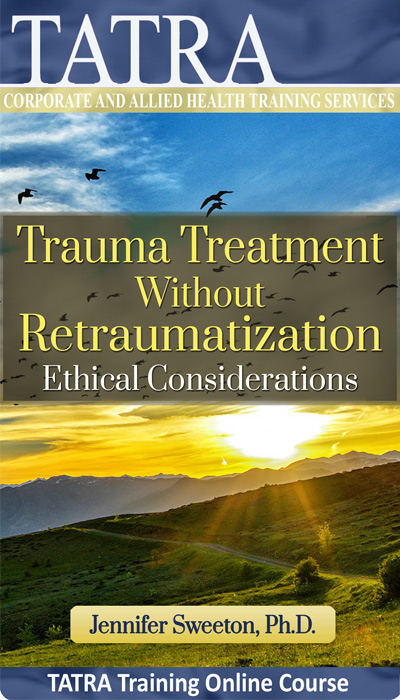31 Jan Trauma Treatment Without Retraumatization: Ethical Considerations

- Avoid retraumatization in therapy
- Become confident in treatment of trauma
- Prevent client dropout
Treatment is necessary for someone to navigate the recovery journey from trauma. But treatment can also be a trigger for re-traumatization, because clients may be asked to explore their feelings and memories as they work to heal them. People who have experienced intense trauma in the past can get caught up in a loop of reliving the terrible distress. Even in therapy, retraumatization is possible and can impede the recovery process. A client can lose trust in their counsellor and the treatment journey unless retraumatization can be redirected by an experienced therapist and an empowering treatment environment.
Many therapists feel hesitant about engaging in trauma-focused work with clients due to the possibility of retraumatization. Retraumatization can severely limit client progress, slow down healing and undermine the therapist’s confidence.
Not only is re-traumatization in therapy terribly distressing for a client, but it can also set them back on their treatment journey and inspire fear and doubt about trusting the recovery process at large. This can be a major setback for people who really need to discover the light on the journey ahead, a reliable support system, and their own self-compassion.
In this online seminar you will learn practical strategies and techniques to ensure you “do no harm” – strategies that help clients remain stable and on the path towards healing, even when processing the most terrifying traumas. These concrete, easy-to-implement techniques can be integrated into the therapy modalities you’re already using, including EMDR, Schema- Focused Therapy, Prolonged Exposure or CBT. Dr Sweeton will provide you with crucial knowledge about the “safety plug-ins” you can include in the therapy and counselling process in order to ensure that your client is constantly on a steady pathway to recovery; your clients will move faster towards healing, and you will be able to prevent your client from going two steps forward and one step backwards.


This training will provide participants clinical knowledge and tools to:
- Name at least one ethical consideration when treating trauma.
- Describe at least three techniques that help clients process trauma without becoming retraumatized.
- State the three main components of memory reconsolidation.
Target Audience:
The target audience for this event includes psychologists, social workers, counsellors, and other clinical mental health professionals.


This online workshop will give you instant access to 2 sessions of video content, accessible via streaming on our website, as well as downloads for supplemental materials. You can view the course content in your own time, there is no time limit on access.
The duration of this workshop is 3 learning hours.
Please click the green ‘Mark Complete’ button on each module as you progress. A certificate of completion will be generated upon finishing the course and completing a short assessment quiz. If the certificate is not showing, please confirm you have marked all sections as ‘Complete’. Please consult your professional organisation/association to confirm whether you are able to claim any CPD points/hours for this online workshop.



 Dr. Jennifer Sweeton is a clinical psychologist, best-selling author, and internationally-recognized expert on anxiety and trauma, and the neuroscience of mental health. She completed her doctoral training at the Stanford University School of Medicine, the Pacific Graduate School of Psychology (now Palo Alto University), and the National Center for PTSD. Additionally, she holds a master’s degree in affective neuroscience from Stanford University, and studied behavioral genetics at Harvard University.
Dr. Jennifer Sweeton is a clinical psychologist, best-selling author, and internationally-recognized expert on anxiety and trauma, and the neuroscience of mental health. She completed her doctoral training at the Stanford University School of Medicine, the Pacific Graduate School of Psychology (now Palo Alto University), and the National Center for PTSD. Additionally, she holds a master’s degree in affective neuroscience from Stanford University, and studied behavioral genetics at Harvard University.